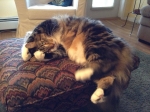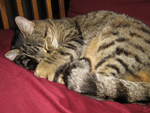General Discussion on any topic relating to CPAP and/or Sleep Apnea.


-
GumbyCT
- Posts: 5778
- Joined: Fri Sep 14, 2007 6:22 pm
- Location: CT
-
Contact:
Post
by GumbyCT » Sun Dec 25, 2011 8:24 pm
pap4life wrote:IMO, some of the posters seem a bit paranoid about the use of faucet water. Unless your health department has deemed it un-drinkable (and there are very few situations of this in this country), then it certainly is safe to put into your humidifier chamber for humidification. You don't hold your breath when you take a shower do you?
Top off the water in the humidifier chamber with water (faucet or distilled), when it is necessary..
I know I am not paranoid about drinking water but I also know that is where these problems come from when used in a cpap humidifier. Distilled water avoids these problems.
4yrs later with the same chamber. How 'bout you?
Someday you may learn this too.
I am rootin for ya.
BeganCPAP31Jan2007;AHI<0.5
I have no doubt, how I sleep affects every waking moment.
I am making progress-NOW I remember that I can't remember
 If this isn’t rocket science why are there so many spaceshots?
If this isn’t rocket science why are there so many spaceshots?
Be your own healthcare advocate!
-
Elle
- Posts: 1229
- Joined: Fri Nov 17, 2006 9:47 pm
- Location: Canada
Post
by Elle » Sun Dec 25, 2011 8:34 pm
I am not paranoid about my drinking water although now that I take an acid reducer (nexium) I am a bit more careful (the acid used to kill the bugs for me) but I use distilled to keep the humidifier in good condition. I have used the same one *until I got a new machine this month) since the summer of 2006 and it looked new....and I confess to cleaning it only rarely and not because it looked like it needed it.
-
Paul56
- Posts: 1016
- Joined: Thu Sep 25, 2008 1:38 pm
- Location: Texas
Post
by Paul56 » Sun Dec 25, 2011 8:36 pm
When it comes to the machine that is blowing air
and moisture into my lungs for 6 to 8 hours each
day I am only partially paranoid.
Therefore, I use distilled exclusively unless I'm
stuck. I'm rarely stuck.
-
Hose_Head
- Posts: 804
- Joined: Wed Mar 12, 2008 6:43 pm
- Location: Ontario Canada
Post
by Hose_Head » Sun Dec 25, 2011 9:12 pm
avi123 wrote:Hose_Head wrote:avi123 wrote:My DME said to top off the distilled water. It's important to use distilled water and clean the chamber properly, boiling it in water for 20 min or preferably in a dishwasher if possible, it's b/c :
1) Plain faucet water carries an organism by the name of Mycobacterium avium (MAC).
2) In the humidifier chamber the water with this organism is made into an aerosol, and we inhale it deeply into our lungs, that's where the problem may result. So if you come down with a cough, let's say, and you go to your doctor, and he looks at you, and he says, well, it may be TB or something, and he'll do tests for all those things, and don't find anything. And you say, but I'm still coughing, he or she may not be testing for the right thing because it could be a low-grade cough that persists for months, you feel lousy, weak, perhaps breathing difficulties, particularly when exerting. That's a good reason to point the finger at the possibility of Mycobacterium avium pulmonary disease. It's very under-diagnosed.
If your "plain faucet water" contains bacteria, then you need to do something about the quality of your water supply. If you have mycobacterium avium, then it's likely you also have fecal coliforms and ecoli, both of which are dangerous and potentially deadly!
As well, I've yet to see good evidence that there is any type of aerosolization taking place in a cpap humidifier. Others have published results of tests in this forum, but the tests appear to have been done without adequate controls or use of scientific method; their results are suspect.
If there is danger from reuse of distilled water or inadequate cleaning of cpap humidifiers, my guess it's more likely to come from airborne spores that may be accumulating and possibly growing in the tank. Evidence of this is the pink or black slime that some have reported finding in their tanks.
Check this:
"Mycobacterium Avium Complex (MAC) is a family of opportunistic bacterial pathogens related to mycobacterium tuberculosis that are found almost everywhere in our environment, including food, water and soil. Some types of MAC bacteria cause disease, primarily in individuals with compromised immune systems but also rarely in individuals without identified susceptibilities.
The prevalence of MAC disease was 1.1 per 100,000 in the pre- AIDS era and these cases were most often recognized in persons with underlying lung disease. Potentially, water is a route of exposure to MAC through ingestion and inhalation of aerosols. However, given a lifetime of exposure to a ubiquitous agent and the limited number of individuals with recognized disease, the lifetime risk from Mycobacterium Avium Complex (MAC) for the normal immunocompetent host is very small."
It seems that you're UNINFORMED with the MAC!
Nope. I'm not uninformed. All I stated was that if you have bacteria in your drinking water, you need to look for a better source of drinking water. Your reply simply states that there is a significant number of people who suffer from a bacteria related disease, some of whom contract it through a water source of exposure. You made no link to cpap humidifiers or SA. Exactly HOW does that make me uninformed?
Are you saying that it's normal, or good to have a contaminated water supply and that I'm uninformed because I say that it's dangerous and that you need a better source of water?
BTW, it's likely that the greatest source of aerosols that one will ever face is when they take their daily shower! If you have MAC in your household water, I'll bet you get it there long before you get it from your cpap humidifier, especially if you are using distilled water (recycled or not) which is the topic of this thread.
I'm workin' on it.
-
archangle
- Posts: 9293
- Joined: Sun Mar 27, 2011 11:55 am
Post
by archangle » Mon Dec 26, 2011 2:35 am
If you're using distilled water and top it off, I recommend dumping it out at least once a week or so. Whatever small amount of crud gets into the water from the air or the filling process will be concentrated as you evaporate away the water from use. I wash my tank in the dishwasher about once a week and throw away whatever water is left from the previous night. .
If there are germs in the tap water, you're breathing them in every time you shower. I don't use tap water in my humdifier because it will concentrate the crud, making it yucky, smelly, and may provide an environment where the bacteria can multiply over time.
By the way, there are bacteria and other microorganisms in the tap water. Water supply companies don't eliminate all germs, they watch for high concentrations or specific germs.
http://water.epa.gov/drink/contaminants/index.cfm
-
happysleeper
- Posts: 164
- Joined: Sun Oct 25, 2009 7:40 pm
Post
by happysleeper » Mon Dec 26, 2011 9:10 am
I have a distiller--I use the Waterwise 4000. I like not having to lug water jugs home from the store, and not adding plastic to the landfill. However it does use electricity to run, which burns coal....ah, the challenges to being green...
It takes about 4 hours to distill a gallon of water. I fill it and turn it on right before I go to bed. We have a well and are near a river with possible contaminants, so we drink the distilled water too.
I am a humidifier water dumper, since I have an easy source of distilled water. I feel more secure that I've dried out the humidifer and hose each night, that way germs aren't growing in a warm, wet, dark environment. My S9 gently blows air after it's stopped, and it dries out the tank. However, I don't wash my tank/hose unless I get a bad cold. I figure I'm using distilled water, so it wouldn't make sense to use tap water to clean it on a regular basis.
I have experimented with leaving the water in the humidifier, and it began to grow green slime perhaps something in my area.
Happy Sleeper














